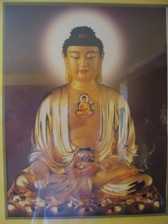 On weekdays, I usually leave home at about five minutes after seven in the morning to send my daughter to school. That means I only watch about five minutes of the Today show on NBC, which starts at 7.00 am sharp.
On weekdays, I usually leave home at about five minutes after seven in the morning to send my daughter to school. That means I only watch about five minutes of the Today show on NBC, which starts at 7.00 am sharp.So I know the Today show people have started a series called “The Mystery of Faith”, which started with Judaism, Christianity and Islam. Then yesterday morning, the focus turned to Eastern religions, and the show displayed some images of the religions that caught my attention, that of the Buddha. However, I could not stay on to watch because of a prior commitment as aforementioned.
So today after work I was able to watch the replay on NBC’s website, which consists of two 5-minute segments hosted by Campbell Brown and filmed in Hong Kong, now part of China.
The first segment started with Ms. Brown standing in front of a gigantic sitting Buddha said to be 10 storey high, one of five such Buddha statues in China. Visitors have to climb 268 steps to reach the Buddha site, according to Ms. Brown.
In her narrative, she covered two eastern religions: Hinduism and Buddhism. On Hinduism, she said that the religion, which has over a billion followers, actually started in Pakistan about three thousands years ago and spread into India. The Buddha was born in India, and Buddhism spread from there into the Asian Continent. There are now about 375 millions Buddhist practitioners (read here for my choice of the term "practitioners") worldwide.
Both religions are not well understood by the West, perhaps sometimes overshadowed by the elaborate ritualistic practices, and apparent worship of multiple deities. Both are often viewed as a kind of enigma, with ornate temples/shrines and mysterious looking gods.
 She correctly asserts that Buddhism is not an institutionalized religion, but rather a personal journey to enlightenment. Therefore, everyone has the divinity within each to become a Buddha.
She correctly asserts that Buddhism is not an institutionalized religion, but rather a personal journey to enlightenment. Therefore, everyone has the divinity within each to become a Buddha.Neither does Buddhism profess total renunciation of the present life, but rather one should actively pursue a meaningful life by helping others, by doing good deeds, and by repudiating all the worldly excesses and exterminating worldly sins such as greed, anger, and delusion.
One of the central beliefs in Buddhism is karma, the totality of actions and conditions executed or experienced in a previous life that bear on the consequences occurring in this life, and likewise of this life on the next life, as symbolized by the wheel of life that turns inexorably. This is a strong motivator to do good, akin to the adage that you reap what you sow.
This brings on another central Buddhist belief: that of the cycle of life from birth, death and to rebirth. In that Buddhism and Hinduism are congruent in the concept of samsara, the continuity of existence, commonly referred to as reincarnation.
A commonality among the various religions is the concept of heaven. However, they depart on how their respective followers get to the heaven. In Buddhism, it is the nirvana. While literally meaning extinction, nirvana is the attainment of the ultimate reality, understanding of the absolute truth, and reaching a state of safety, peace, happiness, and tranquility. However, Buddhism cannot be divorced from this world for it is a humanistic approach to embracing life, hence the term heaven (or pure land) on earth where the path leading to it is laid by the cessation of afflictions through cultivating the Four Noble Truths blogged here.
It came as a pleasant surprise that Buddhism has been highlighted in a national broadcast as part of a concerted effort toward inter-faith understanding so as to explore common ground to help achieve world peace. Late, but better than never.
In this Internet age, websites on Buddhism abound, some of which have migrated to the English medium to gain wider dissemination of the Buddhist teachings. Here is a sample of those websites that provide a wealth of Buddhism-related information in all its various facets:
- Amitabha Buddhist Society of U.S.A.
- Buddhist Association of the United States
- Fo Guang Shan International Buddhist Order
- Tzu Chi Foundation
- Dharma Drum Mountain
Feel free to explore and partake of the wisdom enshrined in the Buddhist teachings.

No comments:
Post a Comment